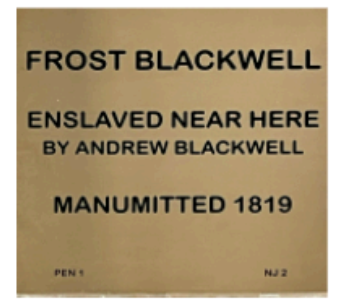
Frost Blackwell’s Biography
A Student Essay by Gwyneth Denham
Slavery was brought into America in the founding stages and thrived for almost 200 years. Throughout the early years of America, generations of people were treated with brutality and constant oppression. Slavery in the United States was very different from other countries since it was a country that enslaved people solely based on race. At the time, slavery was the main production of cash crops like cotton, tobacco, and sugar cane. Since enslaved people were not paid, it made it easy to maintain a low price on manufactured goods, making it essential to the economy. Since slavery contributed to the extreme growth and wealth of the United States, it also became a very controversial topic separating the nation and leading to the Civil War. Slavery may have been a huge factor in the success of the early United States, but the horrors of slavery were detrimental. Slavery forced thousands of enslaved people to work tirelessly for their owners’ benefit and caused them to be continuously looked down upon or paternalized. The sale and treatment of enslaved people dehumanized them and the recurring bias laws against them made it hard to resist slavery. Locally, the work of enslaved people was beneficial to the growth and creation of Hopewell. Frost Blackwell contributed to this community throughout his time, both enslaved and free, while also showing resistance against the system.
Frost Blackwell was born in 1786 in Hunterdon County, NJ. There is no document stating his birth, but we can infer this because of his age in future censuses (“U.S. Census of Hunterdon, NJ for 1850”). His enslaver Andrew Blackwell was also not unfamiliar with owning enslaved people. Information from past escaped slave advertisements shows he owned enslaved people prior to Frost (“Ad for Runaway Slave”). For the most part, none of Frost’s childhood or early life is recorded, but it is generally believed that Frost was born into slavery. That is believed since him being kidnapped is unlikely and at the time chattel slavery was common. Chattel slavery is the inheritance of becoming enslaved from the mother, as well as requiring them to have to serve for their mother’s enslaver. Frost was not educated, as the 1850 census marks him as illiterate. This is an example of the treatment of the enslaved since they weren’t allowed to have any sort of education because of the laws formed in fear of enslaved people revolting.
Frost was married to Nancy Vanvactor on December 8, 1816. (“New Jersey, County Marriages, 1682-1956”). However, the laws of slavery were very strict, and they prevented the gathering of enslaved people which was made alongside the prevention of education. The fact that Andrew permitted this marriage could possibly suggest that Frost had a positive relationship with Andrew. About a year after his marriage in 1817, his first son, Sam Blackwell, was born. Sam was born after the Gradual Emancipation Law, so he was technically free, but it required him to continue to work for Andrew until he turned 25. Sometime around 1816, Andrew Blackwell wrote his will, and within it states that Frost is to be freed and granted one hundred dollars (A. Blackwell). Even though Andrew gave Frost the one hundred dollars without it being required, he left the others in his will currency in pounds. At the time, pounds were a more stable and valuable form of currency than dollars because the weaker economy in America was more prone to collapse. This could illustrate themes of paternalism because Andrew may have believed that Frost was incapable of dealing with a more valuable form of currency.
In 1819, Frost was freed by Benjamin Blackwell and Issac Dunn. Andrew’s exact date of death is unknown, but it is inferred to be in 1819, as that is the year Frost was freed. Since Nancy nor Sam was mentioned in Andrew’s will, they were likely passed down to be enslaved by one of Andrew’s children. After the New Jersey Manumission Law was passed in 1786, it excused enslavers from having to prevent freed enslaved people from becoming homeless or poor. Frost’s freedom was after this law was put in place, and Andrew granted him one hundred dollars regardless. His freedom and the money given to him may have been an additional example of a relationship shared between the two. Frost had bought a farm on Enoch Drake’s land in Mt. Rose, Hopewell, and it is assumed he bought it with the one hundred dollars that he was endowed through the will. In 1827, Enoch’s will stated that the land that Frost currently worked at would be left in the hands of his son, William Drake. (Drake). It is probable that the Drakes saw Frost working on this land as a possible advantage, as Enoch had labeled Frost’s farm worth fifteen hundred dollars. Considering future documents where Frost has no possessed land, Frost was most likely able to create an agreement with William to remain living on the land. Since there have been no other events dated between the time span of 1819-1827, Frost was assumed to be saving up money to free his wife.
In 1827, Frost was able to purchase his wife, Nancy when he was forty-one and she was thirty-one. After he purchased his wife, this gave him the ability to free her. This event shows major forms of resistance against the expectations of slavery because most of the time it was wealthy white men who purchased enslaved people. The purchase of the enslaved was dehumanizing since they were being sold off as if they were objects. The purchase of enslaved people was also extremely costly and the prices could rise to one thousand dollars, an estimated twenty-three thousand dollars today. This is mainly why it was specifically wealthy people who owned enslaved people. The purchase of Nancy must have provoked strong amounts of emotion since Frost had to purchase his wife, but was also required to refer to his wife as a slave in the manumission document by saying, “…set free my female slave Nancy” (F. Blackwell). Along with the already stressful events taking place, Sam who at the time was around ten or eleven, is presumed to have remained with whoever he was enslaved by at the time. Considering he was separated from his parents at such a young age, it must have added more mournfulness to an already depressing situation.
The Gradual Emancipation Law, which was passed in 1804, would have required Sam to serve his enslaver until he was twentyfive. The Gradual Emancipation Law declared anyone born into slavery after July 4, 1804 to be free, but they had to work for their owner until age twenty-five if they were a man, or age twenty-one, if they were a woman. New Jersey was the last Northern State to end slavery and created this law as an attempt to end slavery without abolishing it all at once. This law took advantage of enslaved people while also benefiting the enslavers. Themes of paternalism are evident within this law since enslaved people were declared “free” while still required to work for their owners until the age presumed by their gender. This law supported thoughts that the enslaved were working for their own good because of the desperation for enslaved people to continue to work after being proclaimed free.
Between 1828-1830, after Nancy was freed, Frost had a second son named Noah Blackwell. Noah and Sam were two out of Frost’s five children. Nancy and Frost had another son named Benjamin who is acknowledged in the 1900 census, but the birthdate of Benjamin and the names and ages of the two daughters are unknown. Around the year 1842, Sam Blackwell is thought to have turned 25, releasing him from having to work for his enslaver. Sam married a woman by the name of Maximilla whose last name is unknown as well as the date of the marriage. Noah married a woman named Letta whose last name is also unknown. On May 24, 1864, Noah married another spouse by the name of Hannah Gray (“New Jersey, County Marriages, 1682-1956”). In the same document, Noah’s occupation is stated as a “laborer,” meaning that he may have worked in a factory since they were most common in the North. During the same year, Frost would have been about fifty-six and Nancy forty-six. In the Mt. Rose Map and Pennington Map of 1875, it shows that Frost is not a land owner, and because of this, it is inferred that he remained on William Drake’s land and made some sort of compromise with him (Everts & Stewart, and Thomas Hunter). It is assumed that freeing Nancy would have cost a lot of money and must have prevented him from being able to purchase land of his own. Sometime before 1875, Sam was able to co-own a church in Pennington and buy his own land with Noah (Everts & Stewart, and Thomas Hunter). The documentation of Frost’s death is unidentified, but it is estimated he passed away sometime around 1860, at the approximate age of 74 years old. Nancy lived until 1882 and passed around the age of 86. Frost Blackwell’s life goes on to be remembered as an important part of Hopewell history as he is one of the many brave people who paved the way for the foundation of our communities.
Throughout Frost Blackwell’s life, he managed to challenge the social boundaries created by slavery that separated black from white, while also paving the way for the expansion of the black population within Hopewell. Frost resisted the system by purchasing and freeing his wife and owning a farm. Throughout his life, he was constantly faced with the hardships of slavery while also having to deal with the discrimination of being one of the very few black, landowners in Hopewell. Frost had kids that grew up to possess their own land and after Frost passed, Sam and Noah Blackwell continued to work even further to increase the black population. Frost Blackwell’s story is one of many that were documented within Hopewell and his accomplishments will be remembered as being significant to the growth and expansion of Hopewell, New Jersey.


